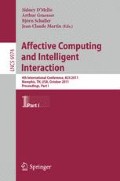Abstract
Microblogging services have nowadays become a very popular communication tool among Internet users. Since millions of users share opinions on different aspects of life everyday, microblogging web-sites are considered as a credible source for exploring both factual and subjective information. This fact has inspired research in the area of automatic sentiment analysis. In this paper we propose an emotional aware clustering approach which performs sentiment analysis of users tweets on the basis of an emotional dictionary and groups tweets according to the degree they express a specific set of emotions. Experimental evaluations on datasets derived from Twitter prove the efficiency of the proposed approach.
Access this chapter
Tax calculation will be finalised at checkout
Purchases are for personal use only
Preview
Unable to display preview. Download preview PDF.
References
Bollen, J., Pepe, A., Mao, H.: Modeling public mood and emotion: Twitter sentiment and socio-economic phenomena. In: ICWSM 2011, arXiv: 0911.1583 (2011)
OĆonnor, B., Balasubramanyan, R., Routledge, B., Smith, N.: From Tweets to Polls: Linking Text Sentiment to Public Opinion Time Series. In: Int. AAAI Conf. on Weblogs and Social Media, Washington DC, pp. 122–129 (2010)
Diakopoulos, N., Shamma, D.: Characterizing Debate Performance via Aggregated Twitter Sentiment. In: ACM Conf. on Human Factors in Computing Systems (CHI), Atlanta Georgia, pp. 1195–1198 (2010)
Esuli, A., Sebastiani, F.: PageRanking WordNet Synsets: An Application on Opinion Mining. In: 45th Annual Meeting of the Association for Computational Linguistics (ACL 2007), Prague, CZ, pp. 424–431 (2007)
Fellbaum, C.: WordNet: An Electronic Lexical Database. MIT Press, Cambridge (1998)
Feldman Barrett, L., Russell, J.A.: Independence and bipolarity in the structure of affect. J. Personality and Social Psychology 74, 967–984 (1998)
Gill, A.J., French R.M., Gergle, D., Oberlander, J.: Identifying Emotional Characteristics from Short Blog Texts. In: 30th Annual Conf. of the Cognitive Science Society, Washington DC, pp. 2237–2242 (2008)
Jansen, B., Zhang, M., Sobel, K., Chowdury, A.: Micro-blogging as online word of mouth branding. In: 27th Int. Conf. Extended Abstracts on Human Factors in Computing Systems, Boston, pp. 3859–3864 (2009)
Hu, M., Liu, B.: Mining and Summarizing Customer Reviews.In: 10th ACM SIGKDD Int. Conference on Knowledge Discovery and Data Mining, Washington USA, pp. 168–177 (2004)
Liu, B.: In: Indurkhya, N., Damerau, F.J. (eds.) Handbook of Natural Language Processing, 2nd edn., Goshen, Connecticut, USA (2010)
Pak, A., Paroubek, P.: Twitter as a corpus for sentiment analysis and opinion mining. In: 7th Conf. on Int. Language Resources and Evaluation, Malta, pp. 1320–1326 (2010)
Pang, B., Lee, L.: Opinion Mining and Sentiment Analysis. Foundations and Trends in Information Retrieval 2(1-2), 1–135 (2008)
Parikh, R., Movassate, M.: Sentiment Analysis of User-Generated Twitter Updates using Various Classification Techniques
Turney, P.: Thumbs Up or Thumbs Down? Semantic Orientation Applied to Unsupervised Classification of Reviews. In: 40th Annual Meeting of the Association for Computational Linguistics, Philadephia, pp. 417–424 (2002)
Wu, Z., Palmer, M.: Verm semantics and lexical selection. In: 32nd Annual Meeting of the Association for Computational Linguistics, New Mexico, pp. 133–138 (1994)
Author information
Authors and Affiliations
Editor information
Editors and Affiliations
Rights and permissions
Copyright information
© 2011 Springer-Verlag Berlin Heidelberg
About this paper
Cite this paper
Tsagkalidou, K., Koutsonikola, V., Vakali, A., Kafetsios, K. (2011). Emotional Aware Clustering on Micro-blogging Sources. In: D’Mello, S., Graesser, A., Schuller, B., Martin, JC. (eds) Affective Computing and Intelligent Interaction. ACII 2011. Lecture Notes in Computer Science, vol 6974. Springer, Berlin, Heidelberg. https://doi.org/10.1007/978-3-642-24600-5_42
Download citation
DOI: https://doi.org/10.1007/978-3-642-24600-5_42
Publisher Name: Springer, Berlin, Heidelberg
Print ISBN: 978-3-642-24599-2
Online ISBN: 978-3-642-24600-5
eBook Packages: Computer ScienceComputer Science (R0)

